Three links for this Wednesday.
* "A consensus has developed during IPY that the Greenland ice sheet will disappear." This and other terrible news on climate change from Newsweek's science editor Sharon Begley.
* California is facing a severe prison crisis, which the disastrous "three strikes" law will only make worse.
* Since Mr Obama took office, the rate of threats against the president has increased 400 per cent from the 3,000 a year or so under President George W. Bush, according to Ronald Kessler, author of In the President's Secret Service.
Wednesday, August 05, 2009
Posted by
Gerry Canavan
at
12:34 PM
|
![]()
Labels: assassination, Barack Obama, California, climate change, eliminationism, Greenland, ice sheet collapse, prison, prison-industrial complex, Secret Service, three strikes
Wednesday, April 08, 2009
More than 300 years ago, a man thought lost at sea re-appeared in Italy with accounts of a civilization inhabiting the interior sea of an undiscovered southern continent. Giuseppe Cognomi composed numerous volumes on this advanced and isolated culture - which he called The Linians - and the singular environment they inhabited at the bottom of the world. Though widely disregarded by the scientific community, the tradition of Linian scholarship has been kept alive through the years by a devoted few. The Society for Linian Studies is the first organized attempt to preserve Cognomi's legacy and progress his research.
Via Boing Boing. These guys sure are going to be pissed that we messed up all their ice.
Posted by
Gerry Canavan
at
2:16 PM
|
![]()
Labels: Antarctica, Cognomi Theory of the Antarctic Interior, cryptogeography, hollow Earth, ice sheet collapse, Linians
Sunday, April 05, 2009
We are cooling. We are not warming. The warming you see out there, the supposed warming, and I use my fingers as quotation marks, is part of the cooling process.
Posted by
Gerry Canavan
at
11:21 AM
|
![]()
Labels: Antarctica, climate change, ecology, ice sheet collapse, Michael Steele
Saturday, February 21, 2009
A rare treat: good news on climate change. A glitch in satellite sensors caused scientists to underestimate the extent of Arctic sea ice by 500,000 square kilometers (193,000 square miles), a California- size area, the U.S. National Snow and Ice Data Center said. Of course, it's good news on an objective level, but perhaps bad news politically, as this is just now other isolated data point for the ignorant, the deluded, and the actively dishonest to latch onto in their efforts to deny real progress.
Posted by
Gerry Canavan
at
12:47 PM
|
![]()
Labels: climate change, denial, George Will, ice sheet collapse, the Arctic, We're saved
Sunday, February 15, 2009
The headline reads, "Climate warming gases rising faster than expected." But what if we expected them to rise faster than expected? By this point, I know I did.
Incidentally, Kevin Drum has the map explaining why it is you're hearing so much about how cold it is this winter. 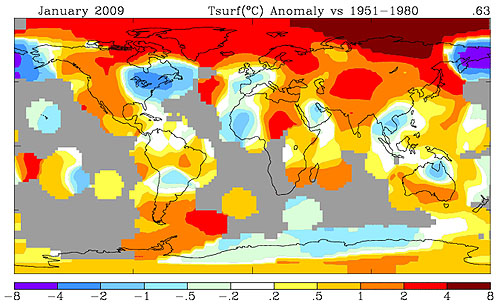
This map compares global temperatures from January 2009 to the average temperature 1951-1980. And as Drum artfully explains:
As you can see, there are only two areas in the entire world that are colder than the 1951-1980 average: eastern Siberia and the American northeast, home to virtually the entire national press corps. So naturally cold temps are getting lots of media play. But, in fact, the rest of the world continues to be substantially warmer than in the recent past, and if you look at entire latitudes, even in this chilly month every single one is warmer than in the past. It would be nice if global warming really were taking a break, but it's not.Take one last look at that chart. Those Arctic temperatures are terrifying.
You can generate your own maps using your own criteria and baselines here. For instance, here's the Jan. 2009 vs. 1981-2008 map, which shows that it was also slightly cooler in most of North America, Europe, and some other places than we've become accustomed to.
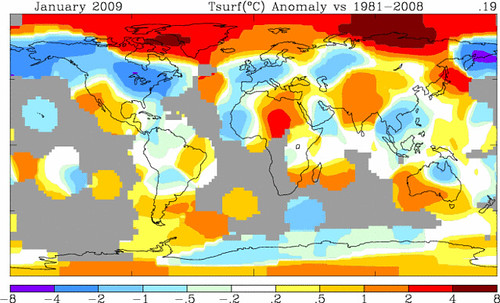
But look again at the Arctic, especially Greenland. Almost no change in the intensity of the red. That's not a great sign—it suggests to me the feedback loops may be kicking in—though it's just one month and we should reluctant to draw conclusions from it alone.
Finally, here's the last decade of winters vs. the previous fifty (okay, forty-six) years, followed by the last decade (year-round) vs the previous forty-six.
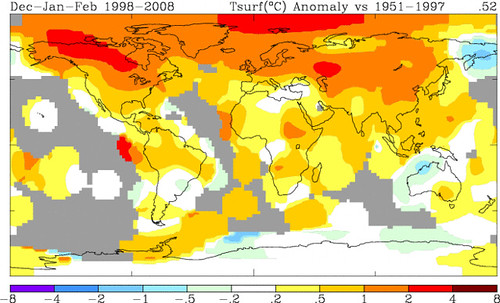
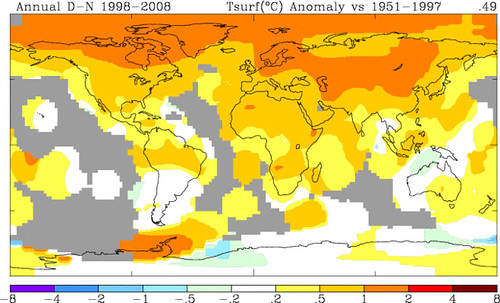
It's generally warmer all the time, but the effect is more pronounced in the winter, especially at the North Pole. We're just lucky most of that ice was already floating...
Posted by
Gerry Canavan
at
10:12 AM
|
![]()
Labels: actually existing media bias, climate change, ecology, ice sheet collapse, maps, mass media, science
Friday, February 06, 2009
Hooray for Friday, hooray for everything.
* The Daily Show nicely nailed the hypocrisy inherent to the Republican position on the stimulus debate last night.
* Scandal at 1600: it turns out the practice of disrespecting the Oval Office by not wearing a jacket inside it—heroically revealed by former chief of staff Andrew Card just this week—goes back decades.
* They've remixed the audiobook versions of Dreams from My Father and The Audacity of Hope. The real scandal is that it took this long for someone to think to do it.
* Remixing the inaugural poem.
* Syllabus for another class on The Wire.
* West Antarctic ice sheet collapse even more catastrophic for U.S. coasts. Icemelt Could Shift Earth's Rotation, Moving Water Northward. Antarctic warming is robust. Everything is fine.
* And will Vermont towns finally get their chance to arrest Cheney? Oh, please yes.
Posted by
Gerry Canavan
at
1:39 PM
|
![]()
Labels: academia, Antarctica, Barack Obama, Cheney, climate change, Daily Show, ice sheet collapse, inaugurations, poetry, politics, remixes, Republicans, stimulus package, syllabi, The Wire, Vermont
Friday, January 09, 2009
Linkdump!
* The headline reads, "Mystery Roar from Faraway Space Detected."
* Probably the stupidest thing ever published in the L.A. Times: a bald anti-science assertion that deadly allergies don't exist.
* 'Going Under': Doctors addicted to drugs. Via MeFi.
* Valuating Facebook in terms of Whoppers.
* I don't know if I'm more worried that my insomnia will lead to paranoia or Exploding Head syndrome.
* News that by this point will surprise no one: Arctic melt 20 years ahead of climate models.
* Legislation has been introduced for a post-Bush truth and reconciliation commission. This is something that is sorely needed, and I hope the Democratic leadership puts its full weight behind it.
* Blago: owned. More discussion here.
* The literary world is abuzz with news of Jack Torrance's latest, All Work and No Play Makes Jack a Dull Boy.
* Cory Doctorow on writing in an age of distraction.
* Things not to do: buying a $1000 house in Detroit. Big ups to Cleveland, which is apparently turning into Detroit.
(Thanks to Bill for some of these!)
Posted by
Gerry Canavan
at
9:39 PM
|
![]()
Labels: allergies, Burger King, Bush, Cleveland, climate change, Cory Doctorow, Detroit, doctors, drugs, ecology, Exploding Head Syndrome, Facebook, ice sheet collapse, Illinois, impeachment, insomnia, literature, medicine, outer space, paranoia, politics, postmodernism, real estate, Rod Blagojevich, science, the Arctic, the cosmos, The Shining, truth and reconciliation commissions, writing
Sunday, December 21, 2008
Sunday.
* Uncool: A U.N. resolution on the right to food passed 180-1. Via Lenin's Tomb.
* Lots of links floating around to this revisionist interpretation of It's a Wonderful Life:
“It’s a Wonderful Life” is a terrifying, asphyxiating story about growing up and relinquishing your dreams, of seeing your father driven to the grave before his time, of living among bitter, small-minded people. It is a story of being trapped, of compromising, of watching others move ahead and away, of becoming so filled with rage that you verbally abuse your children, their teacher and your oppressively perfect wife. It is also a nightmare account of an endless home renovation.* Will Obama gut NASA? Nice followup to last week's discussion on Poli-Sci-Fi Radio.
... Take the extended sequence in which George Bailey (James Stewart), having repeatedly tried and failed to escape Bedford Falls, N.Y., sees what it would be like had he never been born. The bucolic small town is replaced by a smoky, nightclub-filled, boogie-woogie-driven haven for showgirls and gamblers, who spill raucously out into the crowded sidewalks on Christmas Eve. It’s been renamed Pottersville, after the villainous Mr. Potter, Lionel Barrymore’s scheming financier.
Here’s the thing about Pottersville that struck me when I was 15: It looks like much more fun than stultifying Bedford Falls — the women are hot, the music swings, and the fun times go on all night. If anything, Pottersville captures just the type of excitement George had long been seeking.
* On the plus side, Obama pledges allegiance to science.
* Ultimately, these disputes can't really be resolved until Obama is in office. Only then will we know whether Obama's embrace of every establishment and even right-wing figure he can find is a reflection of what the substance of his governing will be, or whether -- as many of his supporters claim -- it's a master strategy designed to diffuse tension and hostility in order to enable easier enactment of his progressive agenda. If Obama devotes genuine efforts to repealing DOMA and don't-ask-don't-tell, I doubt anyone will care how many times he hugs Rick Warren -- just as if Obama really closes Guantanamo, withdraws from Iraq and forges a diplomatic peace with Iran, few people will care how much he embraces Joe Lieberman -- though obviously those are very, very large "ifs." Only time will tell. Via Open Left.
* Arctic melt 20 years ahead of climate models. Response to global warming 20 years behind rational policy-making.
* Hadley Center study warns of “catastrophic” 5°C warming by 2100 on current emissions path. Did I mention we're screwed?
Posted by
Gerry Canavan
at
2:45 PM
|
![]()
Labels: America, Barack Obama, change we can believe in, climate change, ecology, film, ice sheet collapse, inaugurations, It's a Wonderful Life, NASA, Poli-Sci-Fi Radio, politics, Pottersville, revisionist interpretations, Rick Warren, right to food, science, the Arctic, United Nations, we're screwed
Tuesday, December 16, 2008
Late night links.
* Wikipedia's list of common misconceptions.
* It's good to live in a country without nobility or hereditary office.
* Are you a film addict? I am 55.2% yes.
* John Updike considers Mars.
* Matt, Josh, and Ezra consider the fillibuster and the extent to which we should just dump the damn thing.
* Coleman has gone to the Minnesota Supreme Court (a majority of whom have apparently been appointed by Tim Pawlenty) to ask that improperly rejected absentee ballots not be counted in the recount. I've looked, but I haven't actually found any sort of legitimate reason why he thinks ballots that were improperly rejected should stay improperly rejected, other than "I might win that way." Some commentary at TPM.
* Scientists have found the first unequivocal evidence that the Arctic region is warming at a faster rate than the rest of the world at least a decade before it was predicted to happen. We're so very screwed.
Posted by
Gerry Canavan
at
12:31 AM
|
![]()
Labels: Al Franken, American nobility, Caroline Kennedy, climate change, fillibusters, film, hereditary office, ice sheet collapse, John Updike, Mars, Minnesota, Norm Coleman, politics, recounts, stupid online quizzes, the Arctic, the Senate, we're screwed
Thursday, October 09, 2008
Greenland is melting. So is Alaska.
These are completely unconnected events.
Global warming is a myth.
Posted by
Gerry Canavan
at
9:07 PM
|
![]()
Labels: Alaska, apocalypse, climate change, Greenland, ice sheet collapse
Tuesday, September 23, 2008
For the first time, climate scientists have discovered evidence that methane from melting undersea permafrost is being released into the atmosphere. This is very bad.
It's no wonder polar bears are turning to cannibalism.
Posted by
Gerry Canavan
at
8:52 PM
|
![]()
Labels: apocalypse, climate change, ecology, ice sheet collapse, methane, polar bears, the Arctic
Thursday, September 11, 2008
We're saved! 'Melting ice caps could suck carbon from atmosphere.'
It's not often that disappearing Arctic ice is presented as good news for the planet. Yet new research suggests that as the northern polar cap melts, it could lift the lid off a new carbon sink capable of soaking up carbon dioxide.Hooray! Except:
The findings, from two separate research groups, raise the possibility - albeit a remote one - of weakening the greenhouse effect. The researchers say the process of carbon sequestration is already underway.
Even so, the new carbon sink is unlikely to make a significant dent in the huge amounts of CO2 pumped into the atmosphere by industrial activities.Not to mention: it's the sort of thing that only works once.
Posted by
Gerry Canavan
at
1:37 PM
|
![]()
Labels: carbon, climate change, ecology, ice sheet collapse, the Arctic, We're saved
Friday, September 05, 2008
Another day, another 19-square-mile ice sheet collapse. No sweat.
Posted by
Gerry Canavan
at
1:04 AM
|
![]()
Labels: climate change, ecology, ice sheet collapse, the Arctic
Thursday, September 04, 2008
In the Guardian, Tahmima Anam returns to her birthplace of Bangladesh to see how it is dealing with rising sea levels.
The facts about climate change in Bangladesh are indeed grim. The country is a low-lying delta, meaning any slight shift in sea levels will cause the land to be slowly swallowed by the waters of the Bay of Bengal. In the next 50 years, 17% of Bangladesh's landmass is sure to go underwater, causing more than 30 million people to become homeless. Those who live further inland will be only slightly better off: the cyclones and floods that are already a feature of the weather will occur more frequently and with greater ferocity. Geological events stimulated by changes in temperature will mean intense pulses of rainfall followed by periods of drought, and a potential collapse of the monsoon cycle itself. If the sea level rises by 5m (16ft), Dhaka will go under. This is the grim reality that the delegates of the UK/Bangladesh climate change conference, taking place in London next Wednesday, will aim to address. In expectation of the climate change deal that will be struck in Copenhagen next year, it is critical that Bangladesh's concerns are more widely known and understood.Meanwhile, in the Netherlands, a governmental committee has concluded that the Low Country's system of dykes and dams needs to be dramatically strengthened. (via MeFi)
But I have no intention of sounding the death-knell. I know that people in Bangladesh have, for generations, adapted to the cruelties of nature, and my destination is an example of their tenacity. Deep in the delta, a group of islanders, repeated victims of flooding and river erosion, have found a way to live with their unreliable, unforgiving landscape. The small islands on which they live - forced there because, in a country of 180 million people, every inch of available space has to be used - have an average life span of nine years before they are made uninhabitable. I wonder how these islanders cope with this shifting terrain; how they can bear to know that the place they are living in today may not exist tomorrow. I want to know because more and more people in Bangladesh will suffer the same lot, as the sea creeps up; and because, in the not so distant future, this may be the fate of humanity worldwide.
Posted by
Gerry Canavan
at
11:13 AM
|
![]()
Labels: Bangladesh, climate change, dams, ecology, ice sheet collapse, Netherlands, rising sea levels
Sunday, August 31, 2008
For the first time in recorded history, the North Pole is an island. Man, it's a good thing global warming is a myth.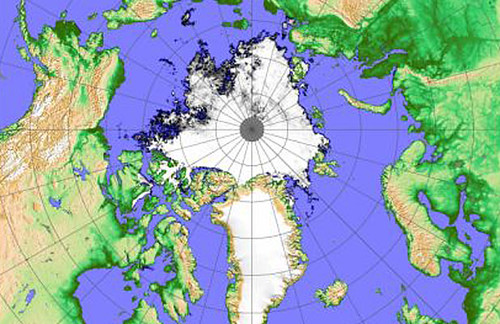
Posted by
Gerry Canavan
at
8:52 PM
|
![]()
Labels: climate change, ecology, ice sheet collapse, sail the luxurious Northwest Passage, the Arctic
Friday, August 22, 2008
The headline reads: 'Satellite images show continued breakup of two of Greenland's largest glaciers.'
What worries Jason Box, an associate professor of geography at Ohio State, and his colleagues, graduate students Russell Benson and David Decker, all with the Byrd Polar Research Center, even more about the latest images is what appears to be a massive crack further back from the margin of the Petermann Glacier.
That crack may signal an imminent and much larger breakup.
"If the Petermann glacier breaks up back to the upstream rift, the loss would be as much as 60 square miles (160 square kilometers)," Box said, representing a loss of one-third of the massive ice field.
Meanwhile, the margin of the massive Jakobshavn glacier has retreated inland further than it has at any time in the past 150 years it has been observed. Researchers believe that the glacier has not retreated to where it is now in at least the last 4,000 to 6,000 years.
Posted by
Gerry Canavan
at
7:56 AM
|
![]()
Labels: climate change, ecology, Greenland, ice sheet collapse, sea levels
Saturday, August 09, 2008
Envirolinks!
* Climate Debate Daily, from the good (if too conservative) folks who bring you Arts & Letters Daily, is the latest addition to the ecology section of my sidebar.
* And from way back in February: the top 50 eco blogs, as ranked by the Guardian.
* 25 tips to make your apartment a green paradise.
* More from the the 55-mph wars: Nissan's new ECO pedal "presses back upward when it senses drivers are driving too quickly."
* 'Junk Mail Produces as Much CO2 as 7 States Combined.' Here's how to stop it.
* 'Prepare for global temperature rise of 4°C, warns top scientist.'
* Scientists predict that the disappearance of Arctic sea ice 'will lead to a large-scale transfer of shellfish, snails, and other animals from the Pacific Ocean to the Atlantic.'
* But will algal ethanol save us? Virgin Airlines says yes!
Posted by
Gerry Canavan
at
8:10 PM
|
![]()
Labels: algae, apartments, biofuels, cars, climate change, coastal flooding, ecology, energy, ethanol, green living, I can't drive 55, ice sheet collapse, junk mail, Peak Oil, the Arctic, We're saved
Tuesday, July 29, 2008
If global warming weren't a myth, we might be in some serious trouble: A four-square-kilometer chunk broke off the Arctic's Ward Hunt Ice Shelf last week. More at Huffington Post Green.
Posted by
Gerry Canavan
at
3:38 PM
|
![]()
Labels: climate change, ecology, ice sheet collapse, the Arctic
Friday, July 11, 2008
Friday morning enviropessimism!
* Another day, another record price for oil: $147.
* Antarctic ice sheet 'hanging by a thread.'
* The Environmental Protection Agency has determined that the value of an American life has dropped nearly $1 million to $6.9 million. Lest you think this merely a theoretical decrease, the number actually has real consequences in environmental policy, and of course the new devaluation won't be good for anyone but Big Pollution:
When drawing up regulations, government agencies put a value on human life and then weigh the costs versus the lifesaving benefits of a proposed rule. The less a life is worth to the government, the less the need for a regulation, such as tighter restrictions on pollution.* Luckily our president takes these important issues very seriously.
Consider, for example, a hypothetical regulation that costs $18 billion to enforce but will prevent 2,500 deaths. At $7.8 million per person (the old figure), the lifesaving benefits outweigh the costs. But at $6.9 million per person, the rule costs more than the lives it saves, so it may not be adopted.
* And of course there's good news, too: pollution may be slowing global warming. We're saved!
Posted by
Gerry Canavan
at
11:18 AM
|
![]()
Labels: Antarctica, Big Pollution, Bush, climate change, ecology, EPA, ice sheet collapse, Peak Oil, politics, pollution, We're saved
Monday, July 07, 2008
Climate Progress's ongoing series on stabilizing atmospheric CO2 at 450 ppm is an excellent resource for anyone seeking, as I am, to better understand both climate science and climate policy.
The apocalyptic stuff can be found in Part 0, though tonight I'm more interested in Part 3's puncturing of my slim hope that a "Manhattan Project for energy" that could somehow save us from ourselves:
“Typically it has taken 25 years after commercial introduction for a primary energy form to obtain a 1 percent share of the global market.”More extreme technopessimism in Part 4.
Note that this tiny toe-hold comes 25 years after commercial introduction. The first transition from scientific breakthrough to commercial introduction may itself take decades. We still haven’t seen commercial introduction of a hydrogen fuel cell car and have barely seen any commercial fuel cells — over 160 years after they were first invented.
This tells you two important things. First, new breakthrough energy technologies simply don’t enter the market fast enough to have a big impact in the time frame we care about. We are trying to get 5% to 10% shares — or more — of the global market for energy, which means massive deployment by 2050 (if not sooner).
Second, if you are in the kind of hurry we are all in, then you are going to have to take unusual measures to deploy technologies far more aggressively than has ever occurred historically. That is, speeding up the deployment side is much more important than generating new technologies. Why? Virtually every supply technology in history has a steadily declining cost curve, whereby greater volume leads to lower cost in a predictable fashion because of economies of scale and the manufacturing learning curve.
Posted by
Gerry Canavan
at
2:05 AM
|
![]()
Labels: 450 ppm, apocalypse, carbon, climate change, ecology, energy, ice sheet collapse, policy, politics




